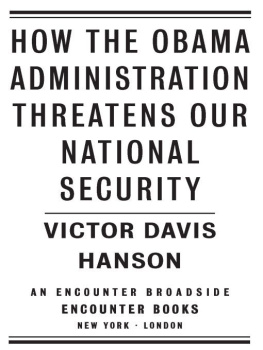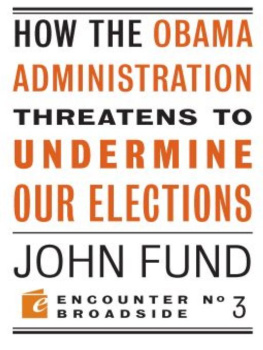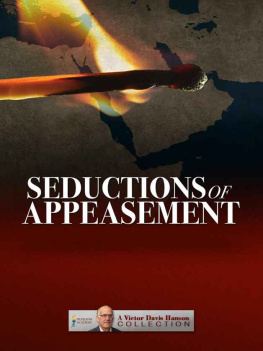IN HIS FIRST YEAR in office, Barack Obama has focused on hitting the reset button as the technique by which America will resolve conflict and craft policies that avoid the arrogance of power characteristic of past administrations. To accomplish this about-face, the president has sought to change the United States role in the world from defender of the post-Cold War international order to apologist for its own misdeeds and agent of global change. We will be on the side of revolutionary governments, privileging the United Nations and hectoring allies in questions involving our system of defense, values, alliances, interests and commerce.
The lynchpin of Obamas foreign policy is the assumption that America is often disliked in the world today, not primarily because of intractable problems of long ancestry, but because of the aggressive nationalism of George W. Bush during the past eight years. All too often, the president assured Arab journalists, the United States starts by dictating.
Our reputation was further harmed, according to this narrative, by the inability of the prior president to have conveyed a sense of caring and goodwill abroad - despite Bush initiatives involving massive and unprecedented new infusions of American aid to curb AIDS in Africa and support for democratic movements in the former third world.
The president has sought to change the United States role in the world from defender of the post-Cold War international order to apologist for its own misdeeds and agent of global change.
In contrast, through empathy and competence, President Obama offers to transcend artificial divides and misplaced suspicions. And he can accomplish radical change not just through his singular charisma, but also through his own unique personal story (e.g., I have Muslim members of my family. I have lived in Muslim countries.), and a more sophisticated, nuanced reliance on soft power and smart diplomacy. Thus, solutions will come from more international consensus and retiring the myth of American exceptionalism. (I believe in American exceptionalism, the president explained, just as I suspect that the Brits be - lieve in British exceptionalism and the Greeks believe in Greek exceptionalism.)
The president will accomplish in a messianic fashion abroad what he also wishes to accomplish by similar techniques at home. There is a long-overdue need for change in helping the worlds dispossessed and neglected. Just as poverty in America arises from the undue privilege of a few, so too are tensions abroad rooted in a system of global inequalities that the United States was crucial in establishing.
FROM WORD TO DEED?
Obamas application of his stated commitments to real-time situations so far has in - volved a realistic appraisal of relative dangers and expenses involved. To force concessions on vulnerable Israel is one thing; its quite another to resist the bloodlust of the Iranian mullahs or the bullying of Vladimir Putin or commit the United States to trillions of dollars in expenditures to meet European-style cap-and-trade emission reduction.
A second constant in his approach has been an avowal of the power of partisan rhetoric. Often, Obama frames foreign-policy issues in terms of domestic politics rather than potential fundamental change abroad. A good example is the so-called war on terror, the bogeyman of the 2008 election. In campaign mode for both the Senate and presidency, and while overseas, candidate Barack Obama in varying ways criticized Bush-era renditions (shipping away prisoners in the dead of night); military tribunals (flawed military commission system); preventative detention (detaining thousands without charge or trial); the surge of troops into Iraq (not working); and the Patriot Act (shoddy and dangerous).
As president, Obama has now grasped that at least some of these once constitutionally suspect policies were, in fact, essential tools in ensuring the ongoing absence of terrorist attacks on the American homeland since Sept. 11, 2001, and therefore must be continued. He likewise assumes that most of his supporters will be content with the symbolism of soaring civil libertarian rhetoric and forget the demand for changes in the Bush antiterrorism protocols that has kept them safe - especially given the multiple terrorist plots foiled by existing Patriot Act protocols in his first year of administration. Thus, the war on terrorism has undergone a cosmetic surgery of euphemism (overseas contingency operations aimed at man-caused disasters) that will end the politics of fear without fundamentally altering existing antiterrorism methods.
Also clear in his early foreign-policy actions is a pattern of short-term accommodation without commensurate consideration of long-term consequences. Perhaps four years of engagement with Iran or concessions to Vladimir Putin might soothe international tensions and resonate with global elites. Yet there is a good chance that displays of American accommodation to the mullahs of Tehran or a change of heart on missile defense that left the Czechs and Poles twisting slowly in the wind will be interpreted by Iran and Russia as symptoms of timidity to be manipulated, rather than as magnanimity to be appreciated - with dire results well down the road after the Obama presidency. Foreign-policy mistakes take time to mature; the serial tepid response to radical Islamic terrorism in the 1990s, for instance, did not bear bitter harvests until 2001.
The war on terrorism has undergone a cosmetic surgery of euphemism that will end the politics of fear without fundamentally altering existing antiterrorism methods.
At some future date, regional hegemons may decide to redefine their existing landscapes on more favorable terms to themselves (e.g., the Islamists and Western Europe; Putin and the former Soviet Republics; China with Taiwan; North Korea with the South; Iran with Israel; and Venezuela with its neighbors). They may well assume, as a result of Obamas early actions and international conversation, that the present government of the United States either would not object to these measures or would do nothing concrete to stop them - or perhaps even privately sympathizes with their particular grievances against the Western-inspired world order.
In other words, as Obamaism completes the transition from word to deed and from theory to practice in foreign policy, a more compliant and understanding America might find itself to be well-liked as much as it is increasingly little-respected - as it gropes clumsily with world crises. A foreign minister who attended a Global Security Review conference in Geneva recently summed up Obamas sermonizing as pointless rhetoric, no matter how elegantly expressed.
Yet we should not underestimate the resonance of pointless rhetoric with those sympathetic to world governance - as the recent awarding of the 2009 Nobel Peace Prize to President Obama attests. The European judges, in their citation, obviously delight in Obama as the anti-Bush sympathetic to their own particular utopian views. But he is seen as beleaguered at home by reactionary opposition that blocks his implementation abroad. He therefore is in need of both moral reinforcement through such an award and a strong reminder that Nobel Peace laureates do not pressure Iran, escalate in Afghanistan, occupy Iraq, tilt toward Israel or keep open the gulag at Guantanamo. In 2002, Jimmy Carter finally grasped how the Nobel committee had morphed into a leftist lobbying organization intent on subordinating American foreign policy to international consensus.
When he reacted accordingly in blatantly obsequious fashion by attacking President Bush on the eve of the Iraq War, he was rewarded with the prize after years of previous frustrating lobbying. But by then, Carter was largely irrelevant, not a sitting president at the reins of power. With Obama, the committee hit pay dirt, and, in a new first, awarded a prize for elegantly expressed intentions rather than real achievement - in hopes of influencing ongoing American foreign policy.











